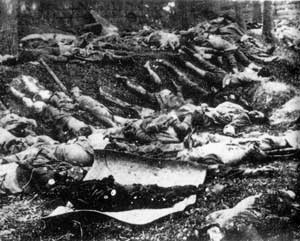Questions and Answers on Hostilities Between Israel and Hezbollah
This document, from Human Rights Watch, does answer many of the questions you might have as to the legality of what Israel and Hezbollah are doing. I was a little bit perplexed in that it indicated that a blockade of Lebanon itself, including sea lanes, might be legitimate if it stopped the transfer of war materials to Hezbollah:
Is Israel’s blockade of Lebanon legitimate?I am sure that there is an Israeli lawyer that will argue persuasively that the blockade will not cause the type of harm to civilian population just described. But all one has to do is see the effect of the recent Israeli bombing and blockade of Gaza to realize that Israel views actions against the entire population as justified, even if it is only one or two soldiers who are in jeopardy. (the differentiation of these soldiers as captives vs. hostages is also open to interpretation).
Israel has targeted the country's only international airport, imposed a naval blockade, attacked ports, and bombed road links out of the country. Blockades as a tool of war are legitimate under international humanitarian law; however, their imposition is still subject to the principle of military necessity and proportionality.
First, the blockade must not have as its primary purpose to intimidate, harass or starve the civilian population. Such actions are proscribed by international humanitarian law, which prohibits armed forces from deliberately causing the civilian population to suffer hunger, particularly by depriving it of its sources of food or supplies.
Second, insofar as Israel attempts to justify the blockade on the grounds of restricting the re-supply of the Hezbollah military, that legitimate purpose must be weighed against the costs to the civilian population. Those costs can also shift over time, as shortages of necessities intensify. Even if a blockade were assumed lawful at the outset, it could become unlawful if mounting civilian costs became too high and outweighed the direct military advantage. In those circumstances – for example, if food or medical supplies ran low – Israel would be obliged to permit free passage of material that is essential for civilians and to protect humanitarian personnel delivering those supplies.
Finally, we have a very short memory. In World War II some of the most horrific reprisals were taken against civilian populations when guerilla action was directed against occupying Nazis:
WWII Nazi murder suspect on trial
Niznansky denies killing 164 people in World War II
A former Nazi commander accused of ordering mass killings in occupied Czechoslovakia during World War II has gone on trial in Munich.
Ladislav Niznansky, 86, is charged with the murder of civilians in the final months of World War II.
He was a member of a Nazi unit that hunted down Slovak resistance fighters and Jews.
Mr Niznansky, a Czechoslovak who took German citizenship, denies having participated in the killings.
He is accused of having headed the Slovak section of a Nazi unit codenamed Edelweiss, after the Germans crushed an uprising against Slovakia's Nazi puppet government in 1944.
Mr Niznansky is accused of ordering the executions of the entire populations of two villages - Ostry Grun and Klak - that had been helping the partisans. Most victims were women and children.
Another Nazi massacre, Marzabotto:

No comments:
Post a Comment